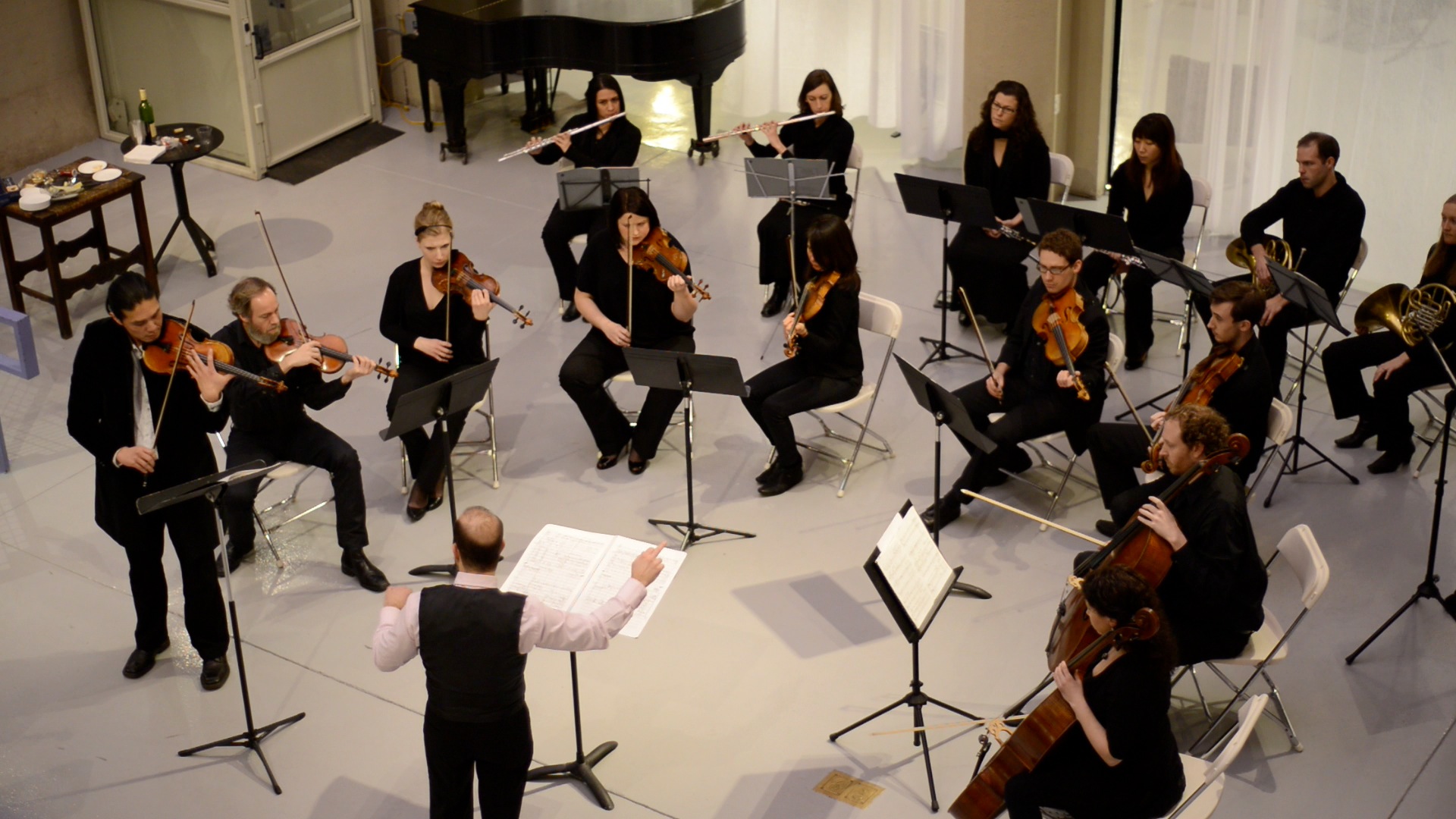Jeff Yang, ACM bring light to Chicago debut of Rihm concerto

Written for and first performed by Anne-Sophie Mutter four years ago, Wolfgang Rihm’s Lichtes Spiel was heard in its Chicago debut Tuesday night.
This premiere of this important violin concerto didn’t take place at Orchestra Hall nor any of the other usual local venues. Instead it was launched, amid the antique mantelpieces and Peruvian desk lamps, at Architectural Artifacts on North Ravenswood, presented by Access Contemporary Music.
Under the leadership of composer Seth Boustead, ACM has carved out a position as one of Chicago’s leading new-music groups, and Tuesday night’s performance at the ensemble’s unique atrium space was fully characteristic. Boustead, conductor Francesco Milioto and colleagues provided informed and engaging introductions in a discerning 90-minute program with the Rihm premiere as the main event. The significant turnout suggests that there are more people interested in intelligent new-music programs than some of Chicago’s more cautious presenters might guess.
Cast in a single movement of 17 minutes and scored for Mozart-sized chamber orchestra, Lichtes Spiel (“Light Game” or “Light Play”) is, as the German composer describes it, “a transparent orchestral movement….light but not “lightweight.’”
Rihm’s description is accurate as far as it goes, but there are darker moments and a striking expressive depth in this music that are certainly not ‘light.” As in Rihm’s other works, the score is obsessively annotated with detailed instructions as to tempos and dynamics that make Mahler seem almost offhand.
Lichtes Spiel was clearly written with the kind of concentrated gleam that Mutter brings to quiet interior music. It’s a testament to the artistry of soloist Jeff Yang, violinist of the Palomar Ensemble, that such comparisons were immediately forgotten with the first notes of Tuesday’s performance.
While much of the concerto is quiet, the searching restless expression is consistently compelling, introspective without ever quite crossing the line to melancholy. The music grows faster and more ardent halfway through with echoes of Mozart and Romantic violin concertos flitting by, as if glimpsed in a distorted glass. The soloist becomes more assertive in leading the musical argument, bursts of bravura fiddle passages coexisting fluently with a Vaughan Williams-like pastoral serenity.
The solo line is virtually nonstop throughout and Jeff Yang delivered a tour de force performance. The violinist was attentive to Rihm’s markings without ever sounding cautious or pedantic. Indeed, Yang played with great freedom and golden tone, expressive and full of feeling, showing a sure sense of line and the work’s unfolding architecture. The coda sounded a bit sudden and peremptory Tuesday but otherwise the performance was first-class, conducted with great skill by Francesco Milioto, the small chamber orchestra sympathetic partners with Yang throughout. Kudos to Boustead and ACM for bringing this important work to Chicago.
The Rihm was preceded by four shorter, contrasted works that set the mood nicely for the main event.
The most striking of these was Interstices, a sextet by Grainne Mulvey (scored for flute, clarinet, horn, violin, cello and prepared piano). It was a challenge to connect this dark, edgy, roiling music with the soft-spoken Irish composer, who was on hand to introduce her work. As the title suggests, Interstices exploits dynamic contrasts and the textures and gaps “between evolving sounds,” especially between pitched and non-pitched notes.
Mulvey’s work is a wild ride with widely terraced dynamics, scraping sounds from (I think) amped cello and prepared piano set against extreme gradations of pianissimo (only partly realized due to the venue’s noisy HVAC setup). With its eerie timbres, ominous swelling horn notes and unearthly lowing winds, Interstices is a fascinating if unsettling listening experience, well played by the musicians and conducted with attentive care by Milioto.
Composed in 1990, Shulamit Ran’s Mirage for mixed quintet (flute, clarinet, violin, cello and piano) is characteristic in its spare, pointillist textures, evoking a mood of concentrated austerity with high static violin under restless woodwinds. The tempo accelerates and the music becomes more chromatic and agitated with strains of sinuous Middle-Eastern music discernible at times. Ran’s fragmented, elliptical style can seem a bit formless over the 11-minute span, though Milioto and the musicians provided fine advocacy with superb playing by Alicia Poot on amplified alto flute.
Erkki-Sven Tüür’s background as a rock musician is powerfully manifest in his best music, his symphonic works, in particular, having a daunting fury and heavy-metal intensity.
The Estonian composer’s Architectonics II for clarinet, cello and prepared piano, is one in a series of seven chamber works scored for various combinations. The opening clarinet solo (well played by Christie Miller) has a febrile, muezzin-like flavor, and the work exploits wide contrasts with emphatic bursts and abrupt silences. Still, the further Tüür’s music gets away from his rock roots, the less convincing it seems. The performance sounded a bit too polite and needed more violent kick, or possibly it’s the fact that doesn’t seem like one of Tüür’s stronger works.
Evan Chambers’ Love Dogs for string trio got the evening off to a lively start. Taking eclectic inspiration from the Sufi poet Rumi and George Clinton’s Funkadelic, Love Dogs combines a bluegrass feel with Minimalist rhythmic insistence and pitch bending to entertaining effect.
ACM’s next event is the Sound of Silent Film Festival 7 p.m. March 19, which will feature new music written to accompany Hiroshi Teshigahara’s Antonio Gaudi, a documentary about the celebrated Spanish architect’s work. acmusic.org.
Posted in Performances




